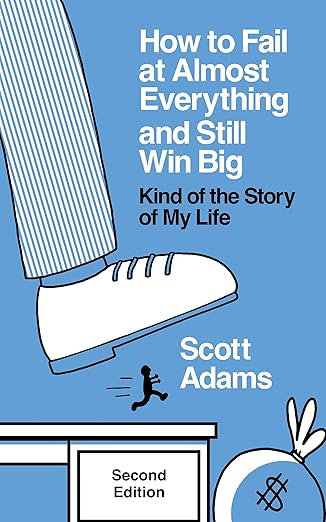Losers have goals. Winners have systems
Once in a generation, a book revolutionizes its category and becomes the preeminent reference that all subsequent books on the topic must pay homage to, in name or in spirit.
How to Fail at Almost Everything and Still Win Big by Scott Adams, creator of Dilbert, is such a book for the field of personal success.
A contrarian pundit and persuasion expert in a class of his own, Adams has reached hundreds of millions directly and indirectly through the 2013 first edition’s straightforward yet counterintuitive advice—to invite failure in, embrace it, then pick its pocket.
Take care of yourself first, because if you’re sick, broke, or stressed out, you won’t be a good friend, spouse, parent, or employee
How to Fail at Almost Everything and Still Win Big is the essential read (or re-read) for anyone who wants to find a unique path to personal victory—and make luck find you in whatever you do.
You can’t directly control luck, but you can move from a game with bad odds to a game with better odds
Here are some key takeaways from the book:
Systems Over Goals
Goals are finite, and failing to achieve them can demotivate you. Instead, adopt systems—repeatable processes that ensure steady improvement.
Example: Instead of aiming to lose 10 kg, develop a system of eating healthily and exercising daily.
Maximize Your Personal Energy
Success is tied to your physical and mental energy. Prioritize diet, exercise, and sufficient sleep to maintain high energy levels.
Work on tasks when your energy levels are naturally high to maximize productivity.
Learn Useful Skills
Success often comes from combining average skills in multiple areas rather than excelling in one
Focus on learning skills like communication, public speaking, persuasion, and basic business principles.
Selfishness Is Productive
Take care of yourself first—your health, finances, and happiness—so you can better help others.
Being “selfish” in the right way builds a stronger foundation for future generosity.
Affirmations Can Work
Adams shares his experience using affirmations to focus on big aspirations. While the exact mechanism is unclear, affirmations can influence mindset and motivation.
6. Happiness Is Health + Freedom
True happiness comes from good health, meaningful work, and the freedom to pursue what matters to you.
Avoid burnout by balancing ambition with self-care.
Fail Forward
Embrace failure as a learning experience. Each failure is a step closer to success if you analyze and adapt.
The key is persistence and using failures to refine your approach.
Luck and Timing Matter
Success is partly about being in the right place at the right time. Increase your exposure to opportunities by meeting new people and trying new things.
Simplify Decisions
Use simple rules to make decisions, such as prioritizing health and energy or always saying yes to opportunities that expand your skill set.
The Value of Humor
Humor is a tool for connecting with others and diffusing tension. It also boosts creativity and resilience.
"If you want something extraordinary, you have two paths: (1) Become the best at one specific thing, or (2) become very good (top 25%) at two or more things











